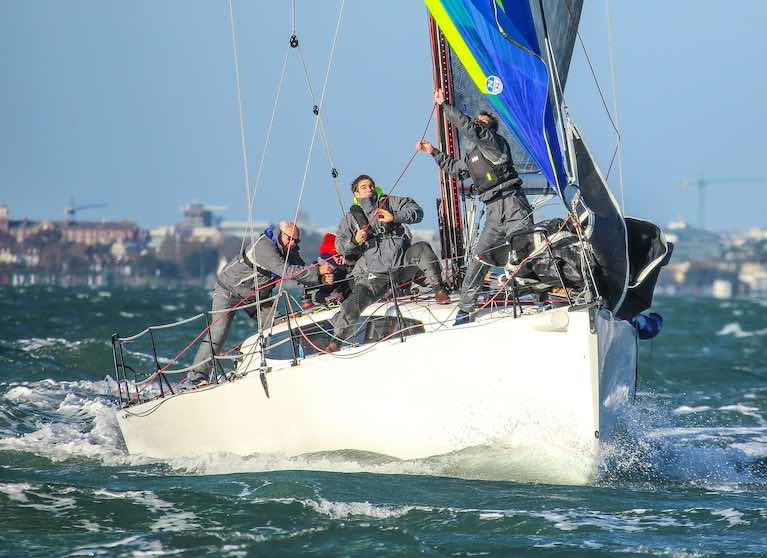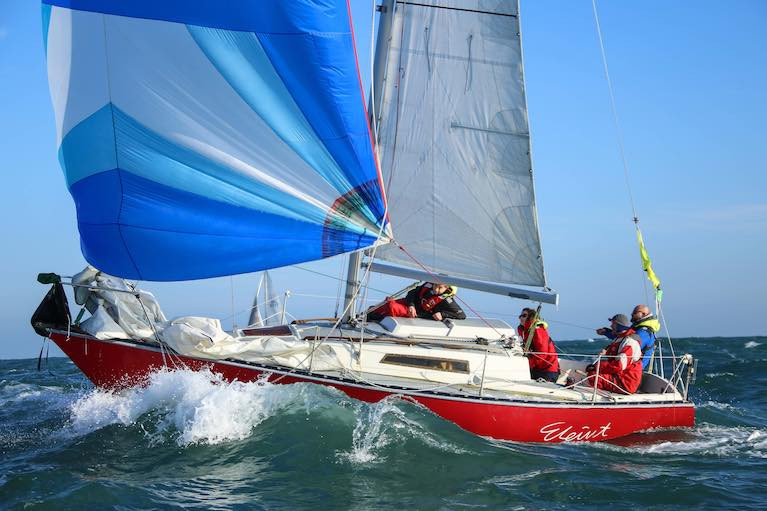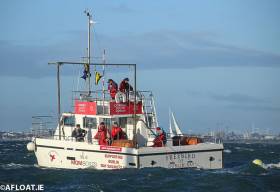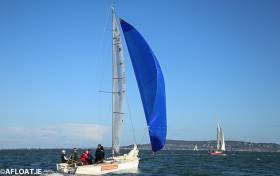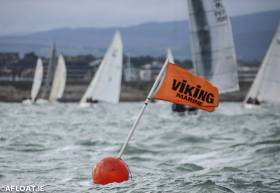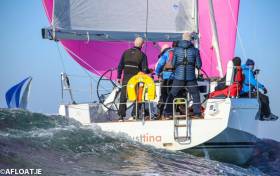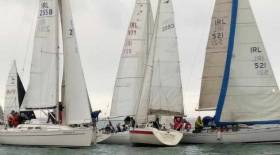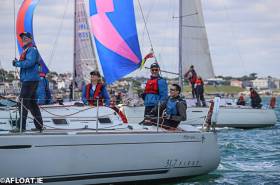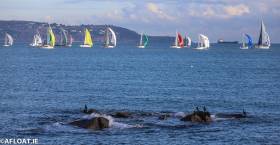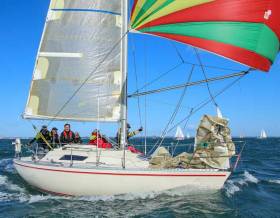Displaying items by tag: Turkey shoot
DBSC Turkey Shoot Postponed But Organisers Keep Hope for Some Christmas Yacht Racing
The 20th edition of the popular Dublin Bay Sailing Club Turkey Shoot Series due to start in November has been postponed due to the Level Five COVID-19 lockdown beginning tonight but organisers hope there may still be a chance of some racing come December.
As Afloat previously reported, November's eight-race DBSC was set to run each Sunday from the 1st November to 20th December and hosted by the Royal Irish Yacht Club.
According to DBSC race organiser, Fintan Cairns, there may still be a chance for some racing prior to Christmas, "if we drop back a level or 2 and sailing in pods, or bubbles is revisited", he says.
The restrictions are due to be reviewed in four weeks.
The short, sharp format of racing has earned a strong following on the capital's waters and the series regularly attracts up to 60 or 70 boats.
Dublin Bay DBSC Turkey Shoot Series Prepares for 20th Anniversary at the Royal Irish Yacht Club
November's eight-race DBSC Turkey Shoot to run each Sunday from the 1st November to 20th December and hosted by the Royal Irish Yacht Club is the 20th edition of the popular series.
The short, sharp format of racing has earned a strong following on the capital's waters under race organiser Fintan Cairns and the series regularly attracts up to 60 or 70 boats.
Racing is under modified ECHO. Cruisers, cruising boats, one-designs and boats that do not normally race are very welcome and perhaps the cut short 2020 season may see more venture out this winter subject to the lifting of Dublin COVID restrictions that brought the curtain down on September sailing this weekend.
In 2019, the 66-boat Dublin Bay-based series was won by the Trapper Eleint with 1720 sportsboats taking second and third overall.
A Notice of Race for the Series will issue shortly.
Trapper Eleint is Now DBSC Turkey Shoot Winner (Revised Result)
Overall results for the DBSC Turkey Shoot have been updated after a miscalculation in the final scores on Sunday. The Trapper Eleint has now been declared the overall winning entry from the 66-boat turnout for the seven-race series on Dublin Bay.
The seventh race of the Royal Irish Yacht Club hosted series set sail in medium westerly winds giving Eleint the Larandy Cup 2019 by two points.
Second overall was one-time series leader, the 1720 Optique. Another 1720 Ricochet third.
DBSC Organisers issued an apology over the mix-up due to a decimal point in the wrong place during the tot of overall scores: 'Apologies to Michal and Ivor of George 1 [a RsTGYC J80 team that were originally declared winners on Sunday] but Eleint gets the cup, George 1 keeps his Christmas dinner, Optique gets another bit of meat and Ricochet is back in favour with his Mammy as he now has a turkey!
Revised results are downloadable below
1720 Sportsboat Optique Leads into Final Race of DBSC Turkey Shoot
No race last weekend means the 1720 sportsboat overall leader after five races sailed will be the boat to watch this weekend in the final race of the 2019 Citroen South DBSC Turkey Shoot on Dublin Bay. Handicaps and Starts will be the same as for last Sunday's cancelled race.
After a benign series for the first four races, the 66-boat fleet will again be watching the weather forecasts this weekend with early indications showing more strong winds for race seven on Sunday. In an update to competitors DBSC organiser Fintan Cairns summed up the feeling of the winter fleet by saying: 'Here's hoping and praying we get racing next Sunday'.
As Afloat previously reported, Optique leads overall on 25 points, five points clear of second overall Mermaid IV, the Beneteau 50 that is a former double overall winner. Third overall is the Grand Soleil 34 Just Tina on 37 points.
If there is no racing, prizegiving and festivities will commence from 1230 at the Royal Irish Yacht Club.
DBSC Turkey Shoot Racing Cancelled Due to Gales on Dublin Bay
Today's sixth race of the DBSC Turkey Shoot Series for cruisers has been cancelled due to strong winds on Dublin Bay.
The final race of the 2019 series will be sailed next Sunday.
Met Eireann says South to southwest winds will reach gale force later today on all Irish coasts and on the Irish Sea.
Southwest to west winds will further increase strong gale to storm force on Irish coasts from Roche's Point to Slyne Head to Fair Head Sunday morning and afternoon.
Forecasted Strong Winds Threaten DBSC Turkey Shoot Race on Dublin Bay
Dublin Bay Sailing Club has warned that the penultimate race of its Turkey Shoot Series on Sunday may be in danger of cancellation due to a strong wind forecast.
XC Weather forecaster indicates westerly winds will blow as hard as 46 mph at 10 am start time for the 66-boat cruiser-racer fleet.
It has prompted Race organiser Fintan Cairns to advise competitors, "It is looking breezy at the moment for next Sunday. No call until Sunday morning. If looking very obviously off, I will email around 0800. Here's hoping we get racing".
So far in the seven-race series winds have only been light to medium over five weeks of racing.
See Handicaps and Start times for Sunday's race downloadable below.
1720 Sportsboat Holds Five Point Lead in DBSC Turkey Shoot on Dublin Bay
With two races left to go in the popular cruiser-racer Dublin Bay Sailing Club (DBSC) Turkey Shoot seven-race series, the 1720 sportsboat Optique leads overall on 25 points, five points clear of second overall Mermaid IV, the Beneteau 50 that is a former double overall winner.
Third overall is the Grand Soleil 34 Just Tina on 37 points.
Light to medium conditions again prevailed for last Sunday's fifth race that was won by the J80, George 6.
Winds have yet to get above 15-knots in the entire Citroen South sponsored pre Christmas series with one race lost so far due to lack of wind.
Racing continues next Sunday.
Download results below.
DBSC Turkey Shoot Starts & Handicaps Released for Fourth Race on Dublin Bay
While DBSC Turkey Shooters are still celebrating the colourful parade of sail across Dublin Bay in last Sunday's third race in winter sunshine, the starts and handicaps have been released for this Sunday's fourth race as the series enters its second half. (Downloadable below).
Results under modified ECHO give the overall lead to the Goodbody's J109 from the RIYC as Afloat reported here.
The 65-boat fleet made a for quite a spectacle that was captured by drone by the INSS (below) and also watched live via Dublin Bay Webcam.
The seven-race event is hosted by the Royal Irish and sponsored by Citroen South with weekly prizes by Drumshanbo Gunpowder Gin, North Sails, UK Sailmakers Ireland and Viking Marine.
J109 'White Mischief' Regains Turkey Shoot Lead After Race Three to Dalkey Island
Royal Irish J109 White Mischief has regained the overall lead of the DBSC Turkey Shoot Series on Dublin Bay even after a lowly 21st place scored in the third race last Sunday morning.
The Tim and Richard Goodbody skippered leader now has a four-point margin over two yachts that are tied for second place, the J97 Windjammer (Lindsay Casey) and the 1720 Ricochet skippered by Kenny Rumball.
The RIYC father and son duo took an early lead in the series after race one before losing it in a high turnout race two to the 1720 sportsboat, Wolfe.
The 65-boat fleet had another light to medium air race last Sunday over a course south of Dun Laoghaire Harbour to Dalkey Island as captured so well in this INSS video.
Racing in the seven-race series sponsored by Citroen South continues this Sunday.
Results are downloadable below.
DBSC Turkey Shoot Starts & Handicaps for Third Race on Dublin Bay
Changes to handicaps have been made for next Sunday's second race of the Dubin Bay Sailing Club Turkey Shoot Series and organiser Fintan Cairns warns that 'some competitors have got a nose bleed' as a result.
Last Sunday's second race had a buoyant 98% turnout of 65 boats.
Despite sizeable changes in the start sequence after the first race there are no changes this week.
Changes to handicaps and the start sequences are downloadable below.
As previously reported, the seven-race Citroen South sponsored series is now led by two 1720s Ricochet and Merlin respectively. Third is the Trapper Eleint.


























